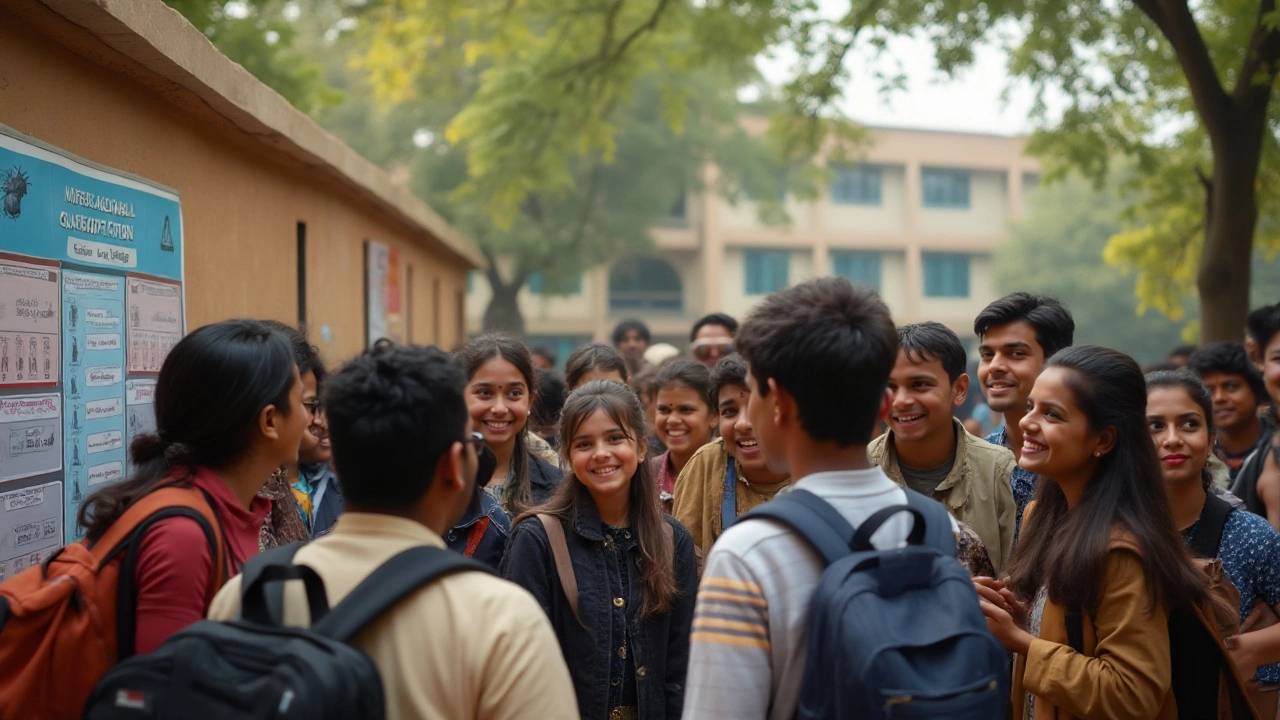Competition is a concept that seems to be woven into the very fabric of human existence. From ancient times, people have been driven to compete, whether it was for resources, mates, or status within their communities. This ingrained behavior prompts us to question whether competition is an inherent part of human nature or simply a product of societal influence.
Understanding the origins and implications of competitive behavior can offer valuable insights. Competition has fueled advancements and innovations throughout history, pushing individuals to excel and societies to progress. Yet, it also poses challenges, especially in educational settings where competitive exams are a common battleground.
In this discussion, we'll explore the various dimensions of human competitiveness. By unraveling its origins and considering its impacts, we hope to uncover how this trait can be channeled positively. Familiarity with these dynamics not only aids in self-awareness but also equips us with strategies to succeed in competitive environments, especially academic ones.
- The Origins of Human Competition
- Biological and Psychological Factors
- Social and Cultural Influences
- The Role of Competition in Education
- Strategies for Excelling in Competitive Exams
The Origins of Human Competition
Human beings are inherently driven by the desire to excel and succeed. This innate drive can be traced back to our early ancestors who relied on competitive instincts for survival. In the prehistoric age, humans competed for basic resources such as food and shelter against both nature and fellow humans. This evolution of competitive behavior was crucial for survival, as rivalries honed skills, promoted adaptation, and ensured the strongest traits were passed down through generations. Simultaneously, it is fascinating to observe how this trait wasn’t solely about aggression or dominance but included cooperation with a competitive edge to maximize survival chances, indicating a dual nature of competition.
Biologically, the roots of competition linger in the structure of our brains. Our neurological framework is wired to respond to competitive scenarios, triggering the release of adrenaline and dopamine, compounds associated with the thrill of competing and achieving. These chemical reactions were advantageous, providing our ancestors with an acute focus and heightened senses when faced with challenges, whether in hunting or in dealing with rival factions. Modern neuroscience continues to explore how these patterns influence us today, suggesting that what we often perceive as 'drive' may be deeply embedded in our DNA.
The social structures of early human groups also laid the groundwork for competitive behaviors. Tribes and clans were centered around hierarchies established through competitions, with leaders often emerging from displays of strength, wisdom, or strategic prowess. Competition extended beyond the physical realm into knowledge and the judicious use of resources. A story from anthropology suggests that even art and rituals were subjected to rivalry, with the most inventive cultural expressions gaining precedence and respect. Over time, these competitive displays fortified social bonds, establishing norms and behaviors that still persist in today's societies.
The Role of Mythology and Culture
As we delve into history, we find competition immortalized in myths and legends across various cultures. From the Greek Olympics, originally conceived as religious festivals, to the storied samurai challenges in Japan, competition was pivotal in shaping cultural identities and values associated with honor and mastery. These historical narratives highlight not only the importance of competition but also the reverence for fair play and ethics, teaching that true competition transcends mere victory. Indeed, these stories helped cultivate a global perspective where competitive pursuits were integrated with moral and ethical consideration.
In conclusion, the origins of human competition are profoundly entrenched in our biological and social evolution. This drive has nurtured innovation and progress, establishing a foundation of resilience and ingenuity in humans. Today, competitive instincts manifest in numerous facets of life, from academia to athletics, underscoring its perpetual relevance and influence. By understanding these origins, we gain a more authentic appreciation of competition’s role in shaping who we are, whilst also guiding us towards using it constructively in our daily lives and broader societal constructs.
Biological and Psychological Factors
Humans have an intrinsic drive for competition that can be traced back to our ancestors who relied on competing for survival. Evolutionary psychologists suggest that this competitive spirit is not just a social construct but deeply rooted in our biology. The Darwinian principle of 'survival of the fittest' underscores the importance of competition in natural selection. Over thousands of years, these instincts have shaped behaviors that promote survival and reproduction. Studies indicate that competition triggers the release of hormones like adrenaline and testosterone, which can enhance performance by increasing energy levels, aggression, and focus. Such physiological responses were crucial when our ancestors had to compete for limited resources or mates, demonstrating how deeply embedded competition is in our nature.
On a psychological level, competition is closely linked with self-esteem and identity. Humans often measure their self-worth against others, fostering a competitive mindset. This can lead to positive outcomes, such as ambition and goal-setting. However, it may also result in stress and anxiety, particularly in high-pressure scenarios like competitive exams. Sigmund Freud, a pioneer of psychoanalysis, discussed the 'death drive' (Thanatos), positing that humans have an instinct towards aggression and competition as a means of achieving balance with the 'life drive' (Eros). While controversial, Freud's theories emphasize the complex interplay between innate drives and behavior, hinting that our urge to compete might serve deeper psychological needs, such as establishing status or achieving personal growth.
The role of environment and upbringing cannot be overlooked when examining the psychological aspects of competition. Childhood experiences and cultural context shape attitudes towards competition. In some cultures, competitiveness is nurtured and valued, whereas in others, cooperation is emphasized. These cultural differences manifest in educational systems worldwide, where customs around competitive exams vary significantly. For example, in many Asian countries, academic success is highly valued, and thus, exams are fiercely competitive. Such environments can either motivate individuals to thrive or succumb under pressure, depending on their psychological resilience and support systems. As Dr. Carol Dweck, a psychologist renowned for her work on mindset, notes, "People with a growth mindset see challenges and failures as opportunities to grow". This perspective suggests that the psychological drivers of competition can be harnessed positively if individuals are encouraged to view competition as a chance to enhance their skills and knowledge.
In recent years, neuroscience has added another layer to our understanding of competition's biological underpinnings. Brain imaging studies reveal that competitive scenarios activate the brain's reward centers, notably the striatum and prefrontal cortex. These areas are associated with pleasure, decision-making, and impulse control, explaining why people often feel a 'rush' during competitive activities. This 'rush' can lead to a cycle of engagement where individuals seek out challenging and competitive environments for the sheer reward of conquering a challenge. Thanks to such insights, educators and behavioral scientists are exploring new ways to present competitive exams as opportunities rather than threats, potentially improving student outcomes and well-being. Such findings illustrate that the appeal of competition is not merely a product of cultural or educational pressure but has a biological foundation that influences human behavior across various contexts.

Social and Cultural Influences
When we delve into the realms of social and cultural influences on human competition, it becomes apparent that the drive to outdo others is often more a product of our environment than of intrinsic nature. Societal norms and expectations play a critical role in shaping competitive behaviors. Children are typically introduced to the concept of competition at a very young age, whether through sports, academics, or even sibling rivalry. Social constructs like ranking systems in schools and awards in workplace settings further reinforce the necessity of performing better than peers. This continuous reinforcement can cause individuals to internalize the belief that they must constantly strive to be better than others to secure their value and place in society.
Culture significantly impacts how competition is perceived and acted upon. In Western cultures, with their deeply ingrained ideals of individualism and personal achievement, competition is often celebrated and viewed as a positive force driving innovation and progress. However, in many Eastern cultures, where community and harmony are highly valued, the harshness of competition may be softened by a greater emphasis on collective success. These cultural variations illustrate that while competition is a universal construct, the methods by which it manifests and is valued can differ markedly around the world.
Anthropologists have noted that different societies have unique competitive rituals and expressions, ranging from the intense legal battles in modern America to the ritualistic form of communal work seen in some indigenous cultures. Each system reflects deep-rooted cultural values. For instance, the intense preparation and national attention given to competitive exams, like China's Gaokao or India's Joint Entrance Examination (JEE), are indicative of how cultural priorities place emphasis on education and intellectual competition as key to personal and societal advancement.
A fascinating insight into cultural attitudes toward competition is provided by sociologist Alfie Kohn, who observed, "Our basic understanding of human nature is distorted by our acceptance of a very ideological view of competition as just the way things are.":
Our basic understanding of human nature is distorted by our acceptance of a very ideological view of competition as just the way things are.This thought-provoking perspective challenges us to reconsider how much of our competitive drive is genuinely innate versus cultivated.
Additionally, media representation plays a profound role in dictating competitive behavior. Films, television, and literature often portray heroes and protagonists as people who overcome great odds, either intellectually or physically, fostering an ideal that competition is a natural path to greatness. It conditions audiences to perceive competitive success as synonymous with personal worth, encouraging an entire societal structure where individuals are judged on how they compare to others.
As we reflect on the cultural forces at play, it's clear that while competition can lead to significant accomplishments and personal growth, it also has the potential to foster stress and anxiety, especially if the stakes are perceived to threaten one's identity or future. Understanding these societal dynamics is essential as we navigate competitive environments, allowing us to develop healthier attitudes towards competition that align with personal values and cultural backgrounds.
The Role of Competition in Education
In educational settings, competition serves as both a motivator and a measurement of individual progress. It’s fascinating to see how students respond to competitive environments, often striving to push their limits and surpass their own expectations. This drive is not just about besting others; it's as much about personal growth and achievement. The existence of competitive exams is a testament to the belief that measuring oneself against peers can encourage improvement and identify areas that need focus. Educational systems around the globe use these exams to filter, qualify, and celebrate the academic prowess of students, setting them up on paths toward career success.
The essence of competition can be found in the ancient practice of the oral exams in Greece and the civil service exams in ancient China. These were designed not only to test knowledge but also to provide a structured way to identify the best minds capable of leading society. In modern education, similar principles apply. The psychological pressure created by competition can foster resilience and contribute to the development of important life skills such as time management, teamwork, and the ability to work under stress. For many, the competitive academic setting is the first taste of real-world challenges they'll encounter later in life.
"The purpose of competition is not to destroy the competition but to push each other to new heights," remarked Ginni Rometty, reflecting on the constructive role that competitive environments can play in development.
In some cases, intense competition can lead to negative stress or burnout, which underscores the importance of balance in the educational landscape. Educators are increasingly aware of this, working to create healthier, more supportive environments that still encourage excellence. In countries like Finland, where less emphasis is placed on strict ranking and more on holistic growth, we can observe students who excel not only academically but in critical thinking and emotional intelligence. This balanced approach supports the argument that while competition can indeed be a great motivator, it should not overshadow the primary aim of education: to develop well-rounded, capable individuals.
The Impact on Learning Styles
Competitive environments may influence the learning styles students adopt. In striving to outperform their peers, students often discover innovative ways to learn and absorb information. For instance, some might gravitate toward story-based learning to simplify complex subjects, while others could develop mnemonic devices to retain facts better. Such methods reflect adaptability, an essential trait employers seek in today’s dynamic job markets. As educational competition shapes learning habits, it prepares students for a world where being able to learn and adapt quickly is often more valuable than static knowledge.

Strategies for Excelling in Competitive Exams
Excelling in competitive exams often requires more than just raw intelligence or memorization prowess; it calls for a strategic approach that harnesses your strengths and bolsters your weaknesses. An effective strategy starts with understanding the exam format and what is expected from you. Delve into past papers and familiarize yourself with the pattern and type of questions, which can demystify the exam and reduce anxiety. Preparation should be systematic, with a balanced schedule that prevents burnout while ensuring comprehensive coverage of the syllabus.
A crucial component of exam success is effective time management. Timetable your study sessions in a way that distributes different subjects evenly, preventing monotony and promoting retention. The Pomodoro Technique, which involves breaking study time into 25-minute focused sessions with short breaks, can be particularly beneficial. It's important to use these breaks for relaxation, allowing your mind to assimilate the knowledge before diving back in.
Effective note-taking is another vital strategy. Creating concise, organized notes aids in better comprehension and recall. Use mnemonic devices and summarization techniques to memorize complex information better. Mind maps can also visually organize information, making connections between concepts clearer. Regular revision of these notes solidifies your grasp of the material and identifies any gaps in your knowledge.
"Success is the sum of small efforts, repeated day in and day out." - Robert Collier
A balanced diet, adequate sleep, and regular physical activity are sometimes overlooked yet crucial elements of exam preparation. Nutritious meals, particularly those rich in omega-3 fatty acids and antioxidants, improve brain function, and sufficient rest ensures cognitive ability remains sharp. Exercise relieves stress and stimulates mental alertness, all contributing significantly to exam performance. Consider practices like yoga or meditation for maintaining mental clarity and composure during the exam season.
Simulated mock exams are indispensable. These mock tests mimic the actual exam conditions, providing valuable practice in time management and identifying performance issues that might not be apparent in regular study sessions. Analyze your results to understand mistakes and rectify them before the actual exam. Mock exams build confidence and help manage stress, giving you a psychological edge.
When exam day arrives, remain calm and composed. Ensure all necessary materials are organized the night before, reducing last-minute stress. Arrive early to compose yourself before the test begins. As the exam starts, skim through the questions and prioritize based on your strengths to maximize scoring potential. Remember to allocate time wisely, and don't linger too long on difficult questions; move on and revisit them if time permits. Such a disciplined approach ensures a greater likelihood of success in achieving your desired results.
